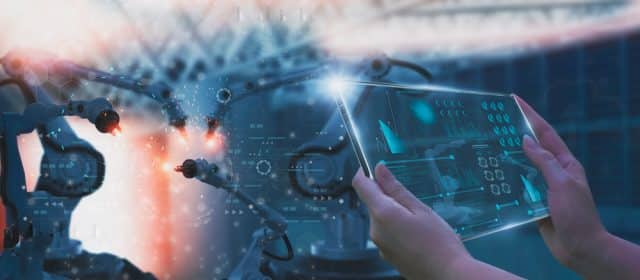Top industries on which AI and ML will have the greatest impact

Artificial intelligence (AI) and machine learning (ML) have been two of the most disruptive technological advancements of the past several years.
Gartner predicts that by 2024, 75 percent of enterprises have shifted from AI pilot stage implementation to operationalization. Their effects have been wide-ranging and promise to continue into the foreseeable future. Businesses will gain a substantial competitive advantage by capitalizing on the benefits of AI and ML.
How Has AI and ML Disrupted Business Processes?
The applications of AI and ML are limitless. Though tremendous advances have been made in the last decade, researchers are still just scratching the surface of its potential. Businesses are finding that effectively implementing AI and ML solutions can lead to improved quality, productivity, growth, and profits.
Some examples of the ways these disruptive technologies are being used today include:
- AI and ML-powered voice or text-based bots to provide first-line customer support
- Automated processes throughout the organization to reduce errors and the need for human interaction
- Embedding AI in customer serving like AI-based agent training, Virtual Employee Assistance, and agent decision support
- Enhancing employee effectiveness with smart tools and applications like facial recognition and computer vision AI
- Discovering insights for customer life cycle value (CLV), predictive maintenance issues before they arise leading to more reliable operations and cost-saving
The Business Benefits of AI and ML
Businesses are beginning to see the concrete benefits of AI and ML solutions. Applications using these technologies are one of the reasons that businesses could handle the increase in remote work caused by the COVID-19 pandemic. This has highlighted their utility in other areas of an industry and become a driving force in more widespread adoption across the business landscape.
AI and ML are being used today to meet business challenges and improve a wide variety of products and services. When used intelligently, AI and ML can demonstrate major impacts on business outcomes. Here is an abridged list of the ways these technologies are being deployed to achieve a competitive advantage:
- Lower operational cost by 30 percent with re-designed operational processes -- Gartner
- Analyzing customer behavior and patterns for future strategy and business benefit by performing data mining on data lakes and large information repositories
- Developing systems that can learn and adapt to changing conditions
- Eliminating human errors associated with certain tasks
- Providing an enhanced and personalized customer experience
- Ensuring system security and compliance with regulatory guidelines by monitoring and data analyzing
- Improving productivity and efficiency with automated and improved processes
- Assisting in making real-time, data-driven decisions
- Increasing revenue by reducing operational costs
The above list is just a sampling of the ways these technologies are being used to achieve advantages across multiple market sectors. Creative use of AI and ML can enable a company to dominate its competitors.
Industries Most Affected by AI and ML
While AI and ML technology can be used in almost any kind of business or organization, certain industries will be more affected than others. There is a multitude of factors driving the implementation of these technologies, from the vast quantities and multiple streams of data available to businesses to affordable and essentially limitless data storage capabilities. Additionally, economical access to high-powered computing resources to run AI and ML applications and the need to make quick decisions regarding market trends greatly impact certain industries
The following industries and market sectors are the ones we identify as being most affected by specific uses of AI and ML technology.
- Healthcare - AI and ML-assisted diagnosis will enable healthcare providers to more accurately provision patient care.
- Insurance/Financial Services/Banking - Trading algorithms based on AI and ML technology can make more timely decisions than human counterparts.
- IT/Software Development - AI and ML-powered tools will continue to be introduced in software development and IT implementations to streamline and improve their processes.
- E-commerce/Retail - AI and ML will continue to be used to improve and personalize the customer experience. Companies that fail to address the desire for personalized services will put themselves at a competitive disadvantage.
- BPO/Customer support/Technical support - AI and ML form the backbone of natural language processing which will continue to advance and produce smarter and more human-like bots.
- Recruitment/Staffing - ML algorithms will be used to identify appropriate candidates for positions, facilitating recruitment efforts.
- Manufacturing - Smart assembly lines and manufacturing plants will increase efficiency and productivity.
- Energy and Mining - The use of AI and ML applications in these markets will result in more efficient energy use and new methods of identifying mineral reserves.
- Logistics and Transportation - The scheduling complexities facing these industries will be more effectively addressed with AI and ML-powered applications.
Businesses taking advantage of the potential of AL and ML will be in much better shape to successfully navigate evolving markets than those that don’t. Organizations ignoring the promise of these technologies do so at their own risk.
The Future of AI and ML in the Business World
As the power of AI and ML technologies continue to evolve, they will find even more applications in business and general society. Some advancements to look for include deep reasoning to augment the advances made possible by AI and ML, training deep learning models with smaller datasets to achieve viable results more quickly and with less raw material, and unsupervised learning to enable systems to be trained with minimal human intervention. Other advancements that are just on the horizon range from more efficient algorithms and AI hardware that promise to take AI and ML beyond mimicking human behavior.
AI and ML technology is here to stay and will continue becoming an essential strategic component of companies searching for a competitive advantage. Businesses failing to adopt these technologies may find themselves struggling to keep up with their innovative rivals.
Photo credit: ART STOCK CREATIVE / Shutterstock

Arindam Ray Chaudhuri, COO at AgreeYa Solutions, has over 25 years of rich industry experience in the technology domain. He has greatly contributed to AgreeYa’s software, solutions and services portfolio, by integrating a global team, defining the technology and business vision of products and services, establishing large scale client engagement and leading time, cost and quality driven value via project governance and solution engineering.
